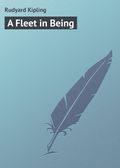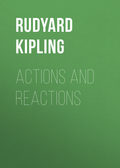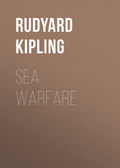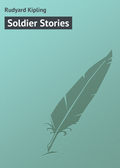
Редьярд Джозеф Киплинг
Traffics and Discoveries
"Where be gwine tu? Port your 'ellum. Aie! you mud-dredger in the fairway, goo astern! Out boats! She'll sink us!"
A clear-cut Navy voice drawled from the clouds: "Quiet! you gardeners there. This is the Cryptic at anchor."
"Thank you for the range," said Pyecroft, and paddled gingerly. "Feel well out in front of you, Alf. Remember your fat fist is our only Marconi installation." The voices resumed:
"Bournemouth steamer he says she be."
"Then where be Brixham Harbor?"
"Damme, I'm a tax-payer tu. They've no right to cruise about this way.
I'll have the laa on 'ee if anything carries away."
Then the man-of-war:
"Short on your anchor! Heave short, you howling maniacs! You'll get yourselves smashed in a minute if you drift."
The air was full of these and other voices as the dinghy, checking, swung. I passed one hand down Laughton's stretched arm and felt an iron gooseneck and a foot or two of a backward-sloping torpedo-net boom. The other hand I laid on broad, cold iron – even the flanks of H.M.S. Cryptic, which is twelve thousand tons.
I heard a scrubby, raspy sound, as though Pyecroft had chosen that hour to shave, and I smelled paint. "Drop aft a bit, Alf; we'll put a stencil under the stern six-inch casements."
Boom by boom Laughlin slid the dinghy along the towering curved wall. Once, twice, and again we stopped, and the keen scrubbing sound was renewed.
"Umpires are 'ard-'earted blighters, but this ought to convince 'em… Captain Panke's stern-walk is now above our defenceless 'eads. Repeat the evolution up the starboard side, Alf."
I was only conscious that we moved around an iron world palpitating with life. Though my knowledge was all by touch – as, for example, when Pyecroft led my surrendered hand to the base of some bulging sponson, or when my palm closed on the knife-edge of the stem and patted it timidly – yet I felt lonely and unprotected as the enormous, helpless ship was withdrawn, and we drifted away into the void where voices sang:
Tom Pearce, Tom Pearce, lend me thy gray mare,
All along, out along, down along lea!
I want for to go to Widdicombe Fair
With Bill Brewer, Sam Sewer, Peter Gurney, Harry Hawke,
Old Uncle Tom Cobley an' all!
"That's old Sinbad an' 'is little lot from the Agatha! Give way, Alf! You might sing somethin', too."
"I'm no burnin' Patti. Ain't there noise enough for you, Pye?"
"Yes, but it's only amateurs. Give me the tones of 'earth and 'ome. Ha!
List to the blighter on the 'orizon sayin' his prayers, Navy-fashion.
'Eaven 'elp me argue that way when I'm a warrant-officer!"
We headed with little lapping strokes toward what seemed to be a fair- sized riot.
"An' I've 'eard the Devolution called a happy ship, too," said Pyecroft. "Just shows 'ow a man's misled by prejudice. She's peevish – that's what she is – nasty-peevish. Prob'ly all because the Agathites are scratching 'er paint. Well, rub along, Alf. I've got the lymph!"
A voice, which Mr. Pyecroft assured me belonged to a chief carpenter, was speaking through an aperture (starboard bow twelve-pounder on the lower deck). He did not wish to purchase any fish, even at grossly reduced rates. Nobody wished to buy any fish. This ship was the Devolution at anchor, and desired no communication with shore boats.
"Mark how the Navy 'olds it's own. He's sober. The Agathites are not, as you might say, an' yet they can't live with 'im. It's the discipline that does it. 'Ark to the bald an' unconvincin' watch-officer chimin' in. I wonder where Mr. Moorshed has got to?"
We drifted down the Devolution's side, as we had drifted down her sister's; and we dealt with her in that dense gloom as we had dealt with her sister.
"Whai! 'Tis a man-o'-war, after all! I can see the captain's whisker all gilt at the edges! We took 'ee for the Bournemouth steamer. Three cheers for the real man-o'-war!"
That cry came from under the Devolution's stern. Pyecroft held something in his teeth, for I heard him mumble, "Our Mister Moorshed!"
Said a boy's voice above us, just as we dodged a jet of hot water from some valve: "I don't half like that cheer. If I'd been the old man I'd ha' turned loose the quick-firers at the first go-off. Aren't they rowing Navy-stroke, yonder?"
"True," said Pyecroft, listening to retreating oars. "It's time to go 'ome when snotties begin to think. The fog's thinnin', too."
I felt a chill breath on my forehead, and saw a few feet of the steel stand out darker than the darkness, disappear – it was then the dinghy shot away from it – and emerge once more.
"Hallo! what boat's that?" said the voice suspiciously.
"Why, I do believe it's a real man-o'-war, after all," said Pyecroft, and kicked Laughton.
"What's that for?" Laughton was no dramatist.
"Answer in character, you blighter! Say somethin' opposite."
"What boat's thatt?" The hail was repeated.
"What do yee say-ay?" Pyecroft bellowed, and, under his breath to me:
"Give us a hand."
"It's called the Marietta– F. J. Stokes – Torquay," I began, quaveringly. "At least, that's the name on the name-board. I've been dining – on a yacht."
"I see." The voice shook a little, and my way opened before me with disgraceful ease.
"Yesh. Dining private yacht. Eshmesheralda. I belong to Torquay Yacht Club. Are you member Torquay Yacht Club?"
"You'd better go to bed, Sir. Good-night." We slid into the rapidly thinning fog.
"Dig out, Alf. Put your nix mangiare back into it. The fog's peelin' off like a petticoat. Where's Two Six Seven?"
"I can't see her," I replied, "but there's a light low down ahead."
"The Agatha!" They rowed desperately through the uneasy dispersal of the fog for ten minutes and ducked round the trawler's bow.
"Well, Emanuel means 'God with us' – so far." Pyecroft wiped his brow, laid a hand on the low rail, and as he boosted me up to the trawler, I saw Moorshed's face, white as pearl in the thinning dark.
"Was it all right?" said he, over the bulwarks.
"Vaccination ain't in it. She's took beautiful. But where's 267, Sir?"
Pyecroft replied.
"Gone. We came here as the fog lifted. I gave the Devolution four. Was that you behind us?"
"Yes, sir; but I only got in three on the Devolution. I gave the Cryptic nine, though. They're what you might call more or less vaccinated."
He lifted me inboard, where Moorshed and six pirates lay round the Agatha's hatch. There was a hint of daylight in the cool air.
"Where is the old man?" I asked.
"Still selling 'em fish, I suppose. He's a darling! But I wish I could get this filthy paint off my hands. Hallo! What the deuce is the Cryptic signalling?"
A pale masthead light winked through the last of the fog. It was answered by a white pencil to the southward.
"Destroyer signalling with searchlight." Pyecroft leaped on the stern- rail. "The first part is private signals. Ah! now she's Morsing against the fog. 'P-O-S-T' – yes, 'postpone' – 'D-E-P-' (go on)! 'departure – till – further – orders – which – will – be com" (he's dropped the other m) "'unicated – verbally. End,'." He swung round. "Cryptic is now answering: 'Ready – proceed – immediately. What – news – promised – destroyer – flotilla?'"
"Hallo!" said Moorshed. "Well, never mind, They'll come too late."
"Whew! That's some 'igh-born suckling on the destroyer. Destroyer signals: 'Care not. All will be known later.' What merry beehive's broken loose now?"
"What odds! We've done our little job."
"Why – why – it's Two Six Seven!"
Here Pyecroft dropped from the rail among the fishy nets and shook the Agatha with heavings. Moorshed cast aside his cigarette, looked over the stern, and fell into his subordinate's arms. I heard the guggle of engines, the rattle of a little anchor going over not a hundred yards away, a cough, and Morgan's subdued hail. … So far as I remember, it was Laughton whom I hugged; but the men who hugged me most were Pyecroft and Moorshed, adrift among the fishy nets.
There was no semblance of discipline in our flight over the Agatha's side, nor, indeed, were ordinary precautions taken for the common safety, because (I was in the Berthon) they held that patent boat open by hand for the most part. We regained our own craft, cackling like wild geese, and crowded round Moorshed and Hinchcliffe. Behind us the Agatha's boat, returning from her fish-selling cruise, yelled: "Have 'ee done the trick? Have 'ee done the trick?" and we could only shout hoarsely over the stern, guaranteeing them rum by the hold-full.
"Fog got patchy here at 12:27," said Henry Salt Hinchcliffe, growing clearer every instant in the dawn. "Went down to Brixham Harbour to keep out of the road. Heard whistles to the south and went to look. I had her up to sixteen good. Morgan kept on shedding private Red Fleet signals out of the signal-book, as the fog cleared, till we was answered by three destroyers. Morgan signalled 'em by searchlight: 'Alter course to South Seventeen East, so as not to lose time,' They came round quick. We kept well away – on their port beam – and Morgan gave 'em their orders." He looked at Morgan and coughed.
"The signalman, acting as second in command," said Morgan, swelling, "then informed destroyer flotilla that Cryptic and Devolution had made good defects, and, in obedience to Admiral's supplementary orders (I was afraid they might suspect that, but they didn't), had proceeded at seven knots at 11:23 p. M. to rendezvous near Channel Islands, seven miles N.N.W. the Casquet light. (I've rendezvoused there myself, Sir.) Destroyer flotilla would therefore follow cruisers and catch up with them on their course. Destroyer flotilla then dug out on course indicated, all funnels sparking briskly."
"Who were the destroyers?"
"Wraith, Kobbold, Stiletto, Lieutenant-Commander A. L. Hignett, acting under Admiral's orders to escort cruisers received off the Dodman at 7 P. M. They'd come slow on account of fog."
"Then who were you?"
"We were the Afrite, port-engine broke down, put in to Torbay, and there instructed by Cryptic, previous to her departure with Devolution) to inform Commander Hignett of change of plans. Lieutenant-Commander Hignett signalled that our meeting was quite providential. After this we returned to pick up our commanding officer, and being interrogated by Cryptic, marked time signalling as requisite, which you may have seen. The Agatha representing the last known rallying-point – or, as I should say, pivot- ship of the evolution – it was decided to repair to the Agatha at conclusion of manoeuvre."
"Is there such a thing as one fine big drink aboard this one fine big battleship?" "Can do, sir," said Pyecroft, and got it. Beginning with Mr. Moorshed and ending with myself, junior to the third first-class stoker, we drank, and it was as water of the brook, that two and a half inches of stiff, treacly, Navy rum. And we looked each in the other's face, and we nodded, bright-eyed, burning with bliss.
Moorshed walked aft to the torpedo-tubes and paced back and forth, a captain victorious on his own quarterdeck; and the triumphant day broke over the green-bedded villas of Torquay to show us the magnitude of our victory. There lay the cruisers (I have reason to believe that they had made good their defects). They were each four hundred and forty feet long and sixty-six wide; they held close upon eight hundred men apiece, and they had cost, say, a million and a half the pair. And they were ours, and they did not know it. Indeed, the Cryptic, senior ship, was signalling vehement remarks to our address, which we did not notice.
"If you take these glasses, you'll get the general run o' last night's vaccination," said Pyecroft. "Each one represents a torpedo got 'ome, as you might say."
I saw on the Cryptic's port side, as she lay half a mile away across the glassy water, four neat white squares in outline, a white blur in the centre.
"There are five more to starboard. 'Ere's the original!" He handed me a paint-dappled copper stencil-plate, two feet square, bearing in the centre the six-inch initials, "G.M."
"Ten minutes ago I'd ha' eulogised about that little trick of ours, but Morgan's performance has short-circuited me. Are you happy, Morgan?"
"Bustin'," said the signalman briefly.
"You may be. Gawd forgive you, Morgan, for as Queen 'Enrietta said to the 'ousemaid, I never will. I'd ha' given a year's pay for ten minutes o' your signallin' work this mornin'."
"I wouldn't 'ave took it up," was the answer. "Perishin' 'Eavens above! Look at the Devolution's semaphore!" Two black wooden arms waved from the junior ship's upper bridge. "They've seen it."
"The mote on their neighbour's beam, of course," said Pyecroft, and read syllable by syllable: "'Captain Malan to Captain Panke. Is – sten – cilled frieze your starboard side new Admiralty regulation, or your Number One's private expense?' Now Cryptic is saying, 'Not understood.' Poor old Crippy, the Devolute's raggin' 'er sore. 'Who is G.M.?' she says. That's fetched the Cryptic. She's answerin': 'You ought to know. Examine own paintwork.' Oh, Lord! they're both on to it now. This is balm. This is beginning to be balm. I forgive you, Morgan!"
Two frantic pipes twittered. From either cruiser a whaler dropped into the water and madly rowed round the ship: as a gay-coloured hoist rose to the Cryptic's yardarm: "Destroyer will close at once. Wish to speak by semaphore." Then on the bridge semaphore itself: "Have been trying to attract your attention last half hour. Send commanding officer aboard at once."
"Our attention? After all the attention we've given 'er, too," said Pyecroft. "What a greedy old woman!" To Moorshed: "Signal from the Cryptic, Sir."
"Never mind that!" said the boy, peering through his glasses. "Our dinghy quick, or they'll paint our marks out. Come along!"
By this time I was long past even hysteria. I remember Pyecroft's bending back, the surge of the driven dinghy, a knot of amazed faces as we skimmed the Cryptic's ram, and the dropped jaw of the midshipman in her whaler when we barged fairly into him.
"Mind my paint!" he yelled.
"You mind mine, snotty," said Moorshed. "I was all night putting these little ear-marks on you for the umpires to sit on. Leave 'em alone."
We splashed past him to the Devolution's boat, where sat no one less than her first lieutenant, a singularly unhandy-looking officer.
"What the deuce is the meaning of this?" he roared, with an accusing forefinger.
"You're sunk, that's all. You've been dead half a tide."
"Dead, am I? I'll show you whether I'm dead or not, Sir!"
"Well, you may be a survivor," said Moorshed ingratiatingly, "though it isn't at all likely."
The officer choked for a minute. The midshipman crouched up in stern said, half aloud: "Then I was right – last night."
"Yesh," I gasped from the dinghy's coal-dust. "Are you member Torquay Yacht Club?"
"Hell!" said the first lieutenant, and fled away. The Cryptic's boat was already at that cruiser's side, and semaphores flicked zealously from ship to ship. We floated, a minute speck, between the two hulls, while the pipes went for the captain's galley on the Devolution.
"That's all right," said Moorshed. "Wait till the gangway's down and then board her decently. We oughtn't to be expected to climb up a ship we've sunk."
Pyecroft lay on his disreputable oars till Captain Malan, full-uniformed, descended the Devolution's side. With due compliments – not acknowledged, I grieve to say – we fell in behind his sumptuous galley, and at last, upon pressing invitation, climbed, black as sweeps all, the lowered gangway of the Cryptic. At the top stood as fine a constellation of marine stars as ever sang together of a morning on a King's ship. Every one who could get within earshot found that his work took him aft. I counted eleven able seamen polishing the breechblock of the stern nine-point-two, four marines zealously relieving each other at the life-buoy, six call-boys, nine midshipmen of the watch, exclusive of naval cadets, and the higher ranks past all census.
"If I die o' joy," said Pyecroft behind his hand, "remember I died forgivin' Morgan from the bottom of my 'eart, because, like Martha, we 'ave scoffed the better part. You'd better try to come to attention, Sir."
Moorshed ran his eye voluptuously over the upper deck battery, the huge beam, and the immaculate perspective of power. Captain Panke and Captain Malan stood on the well-browned flash-plates by the dazzling hatch. Precisely over the flagstaff I saw Two Six Seven astern, her black petticoat half hitched up, meekly floating on the still sea. She looked like the pious Abigail who has just spoken her mind, and, with folded hands, sits thanking Heaven among the pieces. I could almost have sworn that she wore black worsted gloves and had a little dry cough. But it was Captain Panke that coughed so austerely. He favoured us with a lecture on uniform, deportment, and the urgent necessity of answering signals from a senior ship. He told us that he disapproved of masquerading, that he loved discipline, and would be obliged by an explanation. And while he delivered himself deeper and more deeply into our hands, I saw Captain Malan wince. He was watching Moorshed's eye.
"I belong to Blue Fleet, Sir. I command Number Two Six Seven," said Moorshed, and Captain Planke was dumb. "Have you such a thing as a frame- plan of the Cryptic aboard?" He spoke with winning politeness as he opened a small and neatly folded paper.
"I have, sir." The little man's face was working with passion.
"Ah! Then I shall be able to show you precisely where you were torpedoed last night in" – he consulted the paper with one finely arched eyebrow – "in nine places. And since the Devolution is, I understand, a sister ship" – he bowed slightly toward Caplain Malan – "the same plan – "
I had followed the clear precision of each word with a dumb amazement which seemed to leave my mind abnormally clear. I saw Captain Malan's eye turn from Moorshed and seek that of the Cryptic's commander. And he telegraphed as clearly as Moorshed was speaking: "My dear friend and brother officer, I know Panke; you know Panke; we know Panke – good little Panke! In less than three Greenwich chronometer seconds Panke will make an enormous ass of himself, and I shall have to put things straight, unless you who are a man of tact and discernment – "
"Carry on." The Commander's order supplied the unspoken word. The cruiser boiled about her business around us; watch and watch officers together, up to the limit of noise permissible. I saw Captain Malan turn to his senior.
"Come to my cabin!" said Panke gratingly, and led the way. Pyecroft and I stayed still.
"It's all right," said Pyecroft. "They daren't leave us loose aboard for one revolution," and I knew that he had seen what I had seen.
"You, too!" said Captain Malan, returning suddenly. We passed the sentry between white enamelled walls of speckless small arms, and since that Royal Marine Light infantryman was visibly suffocating from curiosity, I winked at him. We entered the chintz-adorned, photo-speckled, brass- fendered, tile-stoved main cabin. Moorshed, with a ruler, was demonstrating before the frame-plan of H.M.S. Cryptic.
" – making nine stencils in all of my initials G.M.," I heard him say. "Further, you will find attached to your rudder, and you, too, Sir" – he bowed to Captain Malan yet again – "one fourteen-inch Mark IV practice torpedo, as issued to first-class torpedo-boats, properly buoyed. I have sent full particulars by telegraph to the umpires, and have requested them to judge on the facts as they – appear." He nodded through the large window to the stencilled Devolution awink with brass work in the morning sun, and ceased.
Captain Panke faced us. I remembered that this was only play, and caught myself wondering with what keener agony comes the real defeat.
"Good God, Johnny!" he said, dropping his lower lip like a child, "this young pup says he has put us both out of action. Inconceivable – eh? My first command of one of the class. Eh? What shall we do with him? What shall we do with him – eh?"
"As far as I can see, there's no getting over the stencils," his companion answered.
"Why didn't I have the nets down? Why didn't I have the nets down?" The cry tore itself from Captain Panke's chest as he twisted his hands.
"I suppose we'd better wait and find out what the umpires will say. The Admiral won't be exactly pleased." Captain Malan spoke very soothingly.
Moorshed looked out through the stern door at Two Six Seven. Pyecroft and I, at attention, studied the paintwork opposite. Captain Panke had dropped into his desk chair, and scribbled nervously at a blotting-pad.
Just before the tension became unendurable, he looked at his junior for a lead. "What – what are you going to do about it, Johnny – eh?"
"Well, if you don't want him, I'm going to ask this young gentleman to breakfast, and then we'll make and mend clothes till the umpires have decided."
Captain Panke flung out a hand swiftly.
"Come with me," said Captain Malan. "Your men had better go back in the dinghy to – their – own – ship."
"Yes, I think so," said Moorshed, and passed out behind the captain. We followed at a respectful interval, waiting till they had ascended the ladder.
Said the sentry, rigid as the naked barometer behind him: "For Gawd's sake! 'Ere, come 'ere! For Gawd's sake! What's 'appened? Oh! come 'ere an' tell."
"Tell? You?" said Pyecroft. Neither man's lips moved, and the words were whispers: "Your ultimate illegitimate grandchildren might begin to understand, not you – nor ever will."
"Captain Malan's galley away, Sir," cried a voice above; and one replied:
"Then get those two greasers into their dinghy and hoist the blue peter.
We're out of action."
"Can you do it, Sir?" said Pyecroft at the foot of the ladder. "Do you think it is in the English language, or do you not?"
"I don't think I can, but I'll try. If it takes me two years, I'll try."
* * * * *
There are witnesses who can testify that I have used no artifice. I have, on the contrary, cut away priceless slabs of opus alexandrinum. My gold I have lacquered down to dull bronze, my purples overlaid with sepia of the sea, and for hell-hearted ruby and blinding diamond I have substituted pale amethyst and mere jargoon. Because I would say again "Disregarding the inventions of the Marine Captain whose other name is Gubbins, let a plain statement suffice."







